高一英语情态动词教案
- 格式:doc
- 大小:87.00 KB
- 文档页数:4
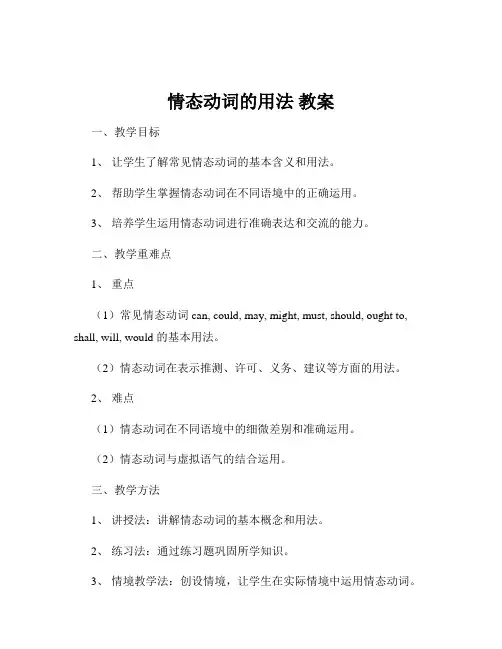
情态动词的用法教案一、教学目标1、让学生了解常见情态动词的基本含义和用法。
2、帮助学生掌握情态动词在不同语境中的正确运用。
3、培养学生运用情态动词进行准确表达和交流的能力。
二、教学重难点1、重点(1)常见情态动词 can, could, may, might, must, should, ought to, shall, will, would 的基本用法。
(2)情态动词在表示推测、许可、义务、建议等方面的用法。
2、难点(1)情态动词在不同语境中的细微差别和准确运用。
(2)情态动词与虚拟语气的结合运用。
三、教学方法1、讲授法:讲解情态动词的基本概念和用法。
2、练习法:通过练习题巩固所学知识。
3、情境教学法:创设情境,让学生在实际情境中运用情态动词。
四、教学过程1、导入(5 分钟)通过展示一些包含情态动词的句子,如“You can do it” “He must be very tired” 等,引导学生思考这些句子中情态动词的作用,从而引出本节课的主题——情态动词的用法。
2、知识讲解(20 分钟)(1)can 和 could表示能力:can 表示现在的能力,could 表示过去的能力。
例如:“I can speak English” “He could play the piano when he was five”表示许可:can 用于现在或将来的许可,could 用于比较委婉的请求许可。
例如:“You can leave now” “Could I use your phone?”表示可能性:can 常用于否定句和疑问句中表示可能性,could 语气更委婉。
例如:“It can't be true” “Could it be a mistake?”(2)may 和 might表示许可:may 用于正式场合或书面语,might 更委婉。
例如:“You may come in” “Might I ask a question?”表示可能性:may 比 might 可能性大。
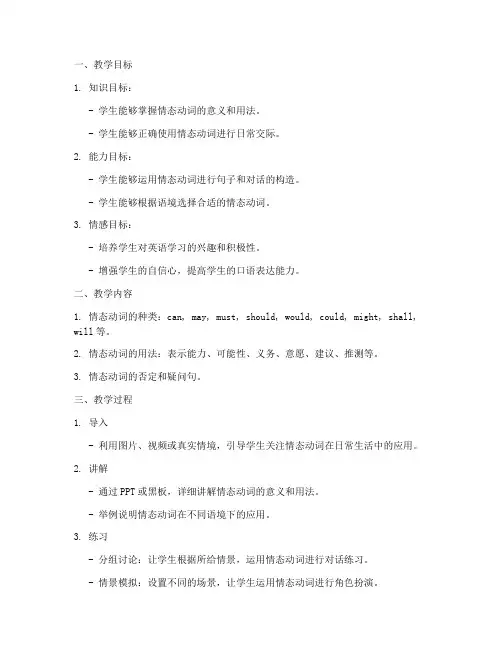
一、教学目标1. 知识目标:- 学生能够掌握情态动词的意义和用法。
- 学生能够正确使用情态动词进行日常交际。
2. 能力目标:- 学生能够运用情态动词进行句子和对话的构造。
- 学生能够根据语境选择合适的情态动词。
3. 情感目标:- 培养学生对英语学习的兴趣和积极性。
- 增强学生的自信心,提高学生的口语表达能力。
二、教学内容1. 情态动词的种类:can, may, must, should, would, could, might, shall, will等。
2. 情态动词的用法:表示能力、可能性、义务、意愿、建议、推测等。
3. 情态动词的否定和疑问句。
三、教学过程1. 导入- 利用图片、视频或真实情境,引导学生关注情态动词在日常生活中的应用。
2. 讲解- 通过PPT或黑板,详细讲解情态动词的意义和用法。
- 举例说明情态动词在不同语境下的应用。
3. 练习- 分组讨论:让学生根据所给情景,运用情态动词进行对话练习。
- 情景模拟:设置不同的场景,让学生运用情态动词进行角色扮演。
- 选择题:通过选择题巩固学生对情态动词用法的掌握。
4. 拓展- 引导学生观察生活中的英语表达,了解情态动词的多样性。
- 鼓励学生创作含有情态动词的句子或对话,提高学生的创造力。
5. 总结- 回顾本节课所学内容,强调情态动词的重要性。
- 布置课后作业,巩固所学知识。
四、教学评价1. 课堂参与度:观察学生在课堂上的积极性、合作精神等。
2. 课堂练习:检查学生对情态动词用法的掌握程度。
3. 课后作业:评估学生对知识的巩固情况。
4. 学生自评和互评:让学生互相评价,提高学生的自我反思能力。
五、教学反思1. 教师在教学过程中,应关注学生的个体差异,因材施教。
2. 结合生活实际,设计丰富多样的教学活动,激发学生的学习兴趣。
3. 注重培养学生的口语表达能力,提高学生的交际能力。
4. 定期进行教学反思,不断调整教学策略,提高教学质量。
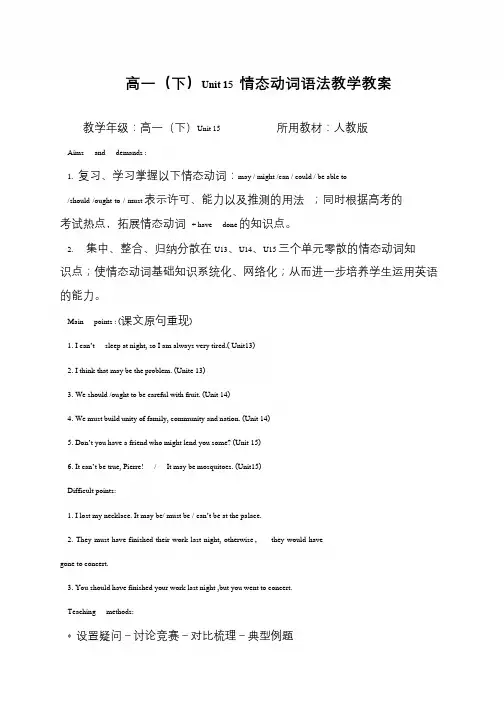
高一(下)Unit 15 情态动词语法教学教案教学年级:高一(下)Unit 15 所用教材:人教版Aims and demands :1. 复习、学习掌握以下情态动词:may / might /can / could / be able to/should /ought to / must 表示许可、能力以及推测的用法;同时根据高考的考试热点,拓展情态动词+ have done 的知识点。
2. 集中、整合、归纳分散在U13、U14、U15 三个单元零散的情态动词知识点;使情态动词基础知识系统化、网络化;从而进一步培养学生运用英语的能力。
Main points : (课文原句重现)1. I can’t sleep at night, so I am always very tired.( Unit13)2. I think that may be the problem. (Unite 13)3. We should /ought to be careful with fruit. (Unit 14)4. We must build unity of family, community and nation. (Unit 14)5. Don’t you have a friend who might lend you some? (Unit 15)6. It can’t be true, Pierre! / It may be mosquitoes. (Unit15)Difficult points:1. I lost my necklace. It may be/ must be / can’t be at the palace.2. They must have finished their work last night, otherwise,they would have gone to concert.3. You should have finished your work last night ,but you went to concert. Teaching methods:* 设置疑问-讨论竞赛-对比梳理-典型例题。
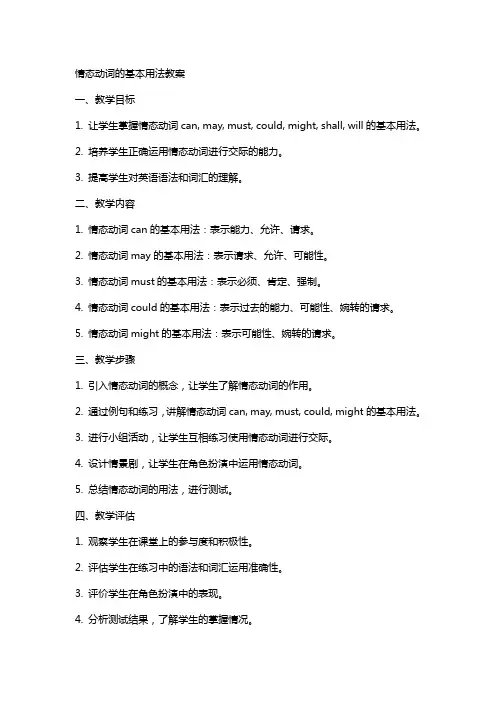
情态动词的基本用法教案一、教学目标1. 让学生掌握情态动词can, may, must, could, might, shall, will的基本用法。
2. 培养学生正确运用情态动词进行交际的能力。
3. 提高学生对英语语法和词汇的理解。
二、教学内容1. 情态动词can的基本用法:表示能力、允许、请求。
2. 情态动词may的基本用法:表示请求、允许、可能性。
3. 情态动词must的基本用法:表示必须、肯定、强制。
4. 情态动词could的基本用法:表示过去的能力、可能性、婉转的请求。
5. 情态动词might的基本用法:表示可能性、婉转的请求。
三、教学步骤1. 引入情态动词的概念,让学生了解情态动词的作用。
2. 通过例句和练习,讲解情态动词can, may, must, could, might的基本用法。
3. 进行小组活动,让学生互相练习使用情态动词进行交际。
4. 设计情景剧,让学生在角色扮演中运用情态动词。
5. 总结情态动词的用法,进行测试。
四、教学评估1. 观察学生在课堂上的参与度和积极性。
2. 评估学生在练习中的语法和词汇运用准确性。
3. 评价学生在角色扮演中的表现。
4. 分析测试结果,了解学生的掌握情况。
五、教学资源1. 情态动词的PPT演示。
2. 情态动词的例句和练习题。
3. 情景剧的角色扮演材料。
4. 测试题。
5. 录音机或音响设备,用于播放情景剧的音频。
六、教学扩展1. 引入其他情态动词如shall和will,解释它们在不同语境中的用法。
2. 通过例句和练习,让学生掌握shall和will的区别。
3. 进行小组活动,让学生在实际语境中运用shall和will。
七、课堂互动1. 设计问答环节,让学生用情态动词回答问题。
2. 进行情态动词的接龙游戏,激发学生的学习兴趣。
3. 组织学生进行情态动词的知识竞赛,增强学生的团队合作精神。
八、家庭作业1. 布置相关的练习题,让学生巩固情态动词的用法。
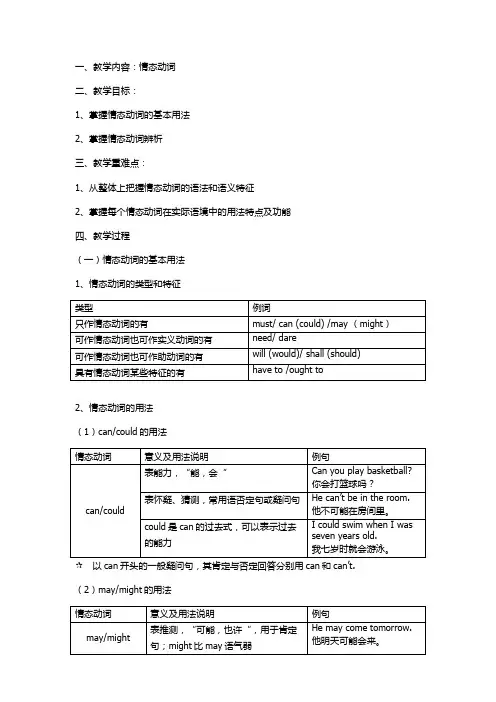
一、教学内容:情态动词二、教学目标:1、掌握情态动词的基本用法2、掌握情态动词辨析三、教学重难点:1、从整体上把握情态动词的语法和语义特征2、掌握每个情态动词在实际语境中的用法特点及功能四、教学过程(一)情态动词的基本用法1、情态动词的类型和特征2、情态动词的用法(1)can/could的用法以can开头的一般疑问句,其肯定与否定回答分别用can和can’t. (2)may/might的用法✩can 和may都可用来表征求意见或许可,意为“可以“,一般可互换。
(3)must的用法✩在疑问句和否定句中一般用can 表示推测,否定句中也可用may,但may not表示“可能不“,而can’t表示”不可能“。
在否定句中,mustn’t表示禁止,”不允许“。
(4)need 和dare的用法二者既可作情态动词也可作实义动词(5)shall(should),will(would)的用法(6)题组练习✩Don’t drive too fast, or you ___have a accident.✩May I park my car here?No, you ___.You should park the car in the car park.✩What a nice day! ___we go surfing?Good idea.✩You ___worry about him. He is old enough to look after himself.✩There is a book on the ground. It ___be John’s. Look! His photo is in it. ✩ A teacher ___also make a mistake if he is not careful enough.✩Let’s go dancing tonigh.Sorry, I ___. I have to go to a meeting.答案:may/mustn’t/Shall/needn’t(don’t have to)/must/may/can’t(二)情态动词辨析1、can和be able to的区别can和be able to表示能力时用法同,can只用于一般现在时和一般过去时(could),其他时态要用be able to.另外,表示过去某一特定情况下成功做到某事,用be able to.Jim couldn’t speak Chinese last year, but now he can.我们下周能回来。
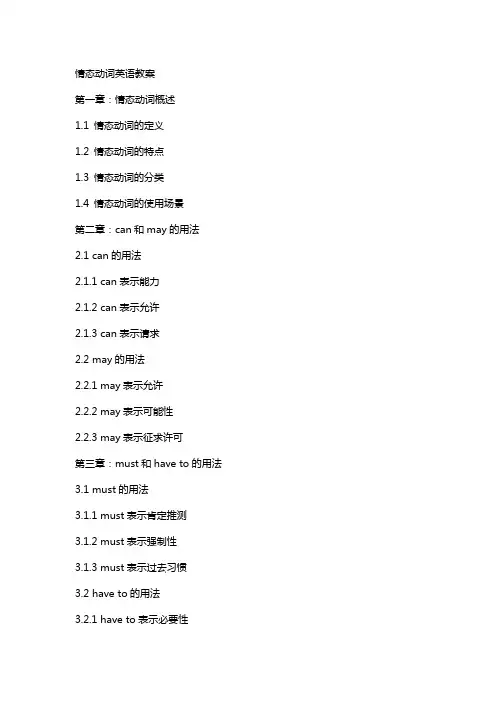
情态动词英语教案第一章:情态动词概述1.1 情态动词的定义1.2 情态动词的特点1.3 情态动词的分类1.4 情态动词的使用场景第二章:can和may的用法2.1 can的用法2.1.1 can表示能力2.1.2 can表示允许2.1.3 can表示请求2.2 may的用法2.2.1 may表示允许2.2.2 may表示可能性2.2.3 may表示征求许可第三章:must和have to的用法3.1 must的用法3.1.1 must表示肯定推测3.1.2 must表示强制性3.1.3 must表示过去习惯3.2 have to的用法3.2.1 have to表示必要性3.2.2 have to表示过去不得不3.2.3 have to表示将来不得不第四章:情态动词的否定句和疑问句4.1 情态动词的否定句4.1.1 构成方式4.1.2 否定句的用法4.2 情态动词的疑问句4.2.1 构成方式4.2.2 疑问句的用法第五章:情态动词的时态配合5.1 情态动词与一般现在时5.2 情态动词与一般过去时5.3 情态动词与一般将来时5.4 情态动词与现在进行时5.5 情态动词与过去进行时5.6 情态动词与现在完成时5.7 情态动词与过去完成时5.8 情态动词与将来完成时第六章:情态动词短语6.1 情态动词+动词原形6.2 情态动词+be+动词ing6.3 情态动词+have+过去分词6.4 情态动词+do/does/did+动词原形6.5 情态动词+would+动词原形第七章:情态动词的常用表达7.1 情态动词+not+动词原形7.2 情态动词+疑问词+动词原形7.3 情态动词+ever+动词原形7.4 情态动词+for+名词/代词+动词原形7.5 情态动词+不定式第八章:情态动词在特定场景中的应用8.1 情态动词在日常生活场景中的应用8.2 情态动词在工作场景中的应用8.3 情态动词在教育场景中的应用8.4 情态动词在社交场景中的应用8.5 情态动词在旅游场景中的应用第九章:情态动词的翻译技巧9.1 情态动词的直译9.2 情态动词的意译9.3 情态动词的转译9.4 情态动词的省略译9.5 情态动词的特殊译法第十章:情态动词的练习与巩固10.1 情态动词的选择题10.2 情态动词的填空题10.3 情态动词的翻译题10.4 情态动词的口语练习10.5 情态动词的综合练习第十一章:情态动词在阅读理解中的应用11.1 情态动词在阅读理解中的重要性11.2 情态动词在推理判断中的应用11.3 情态动词在事实细节查找中的应用11.4 情态动词在作者态度推断中的应用11.5 情态动词在阅读练习中的实际操作第十二章:情态动词在写作中的运用12.1 情态动词在写作中的作用12.2 情态动词在表达观点和态度中的应用12.3 情态动词在提出建议和请求中的应用12.4 情态动词在叙述过去事件中的应用12.5 情态动词在写作练习中的实际操作第十三章:情态动词在听力理解中的应用13.1 情态动词在听力理解中的重要性13.2 情态动词在理解说话者意图中的应用13.3 情态动词在捕捉关键信息中的应用13.4 情态动词在对话情境理解中的应用13.5 情态动词在听力练习中的实际操作第十四章:情态动词在口语交流中的应用14.1 情态动词在口语交流中的重要性14.2 情态动词在表达可能性中的应用14.3 情态动词在表达意愿和决心中的应用14.4 情态动词在提出问题和回答中的应用14.5 情态动词在口语交流练习中的实际操作第十五章:情态动词的测试与评估15.1 情态动词的测试类型15.2 情态动词的测试题型15.3 情态动词的评估标准15.4 情态动词的自我评估15.5 情态动词的提升策略重点和难点解析本文主要介绍了情态动词的基本概念、用法、语法规则、实际应用场景、练习与测试等各个方面。
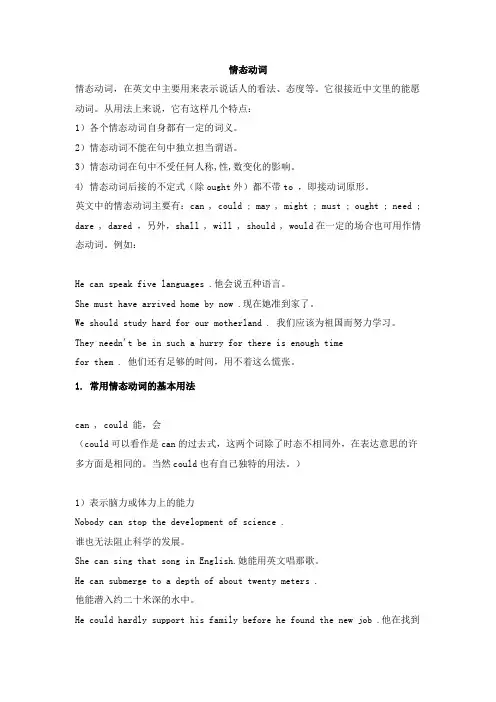
情态动词情态动词,在英文中主要用来表示说话人的看法、态度等。
它很接近中文里的能愿动词。
从用法上来说,它有这样几个特点:1)各个情态动词自身都有一定的词义。
2)情态动词不能在句中独立担当谓语。
3)情态动词在句中不受任何人称,性,数变化的影响。
4) 情态动词后接的不定式(除ought外)都不带to ,即接动词原形。
英文中的情态动词主要有:can , could ; may , might ; must ; ought ; need ; dare , dared ,另外,shall , will , should , would在一定的场合也可用作情态动词。
例如:He can speak five languages .他会说五种语言。
She must have arrived home by now .现在她准到家了。
We should study hard for our motherland . 我们应该为祖国而努力学习。
They needn't be in such a hurry for there is enough timefor them . 他们还有足够的时间,用不着这么慌张。
1. 常用情态动词的基本用法can , could 能,会(could可以看作是can的过去式,这两个词除了时态不相同外,在表达意思的许多方面是相同的。
当然could也有自己独特的用法。
)1)表示脑力或体力上的能力Nobody can stop the development of science .谁也无法阻止科学的发展。
She can sing that song in English.她能用英文唱那歌。
He can submerge to a depth of about twenty meters .他能潜入约二十米深的水中。
He could hardly support his family before he found the new job .他在找到那份新工作前几乎无法养家。
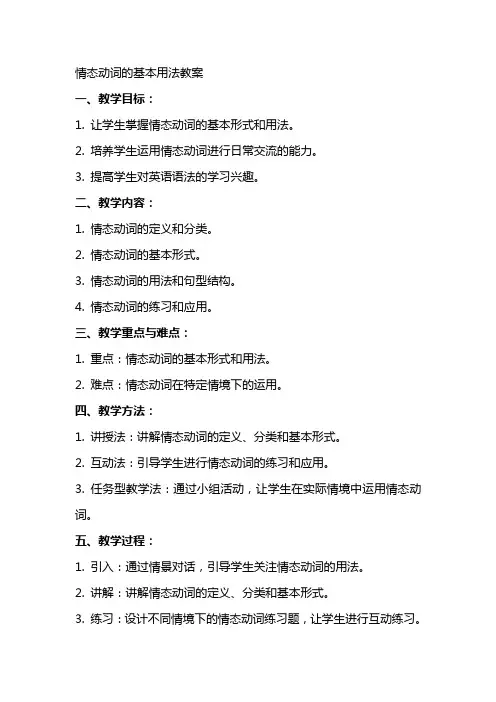
情态动词的基本用法教案一、教学目标:1. 让学生掌握情态动词的基本形式和用法。
2. 培养学生运用情态动词进行日常交流的能力。
3. 提高学生对英语语法的学习兴趣。
二、教学内容:1. 情态动词的定义和分类。
2. 情态动词的基本形式。
3. 情态动词的用法和句型结构。
4. 情态动词的练习和应用。
三、教学重点与难点:1. 重点:情态动词的基本形式和用法。
2. 难点:情态动词在特定情境下的运用。
四、教学方法:1. 讲授法:讲解情态动词的定义、分类和基本形式。
2. 互动法:引导学生进行情态动词的练习和应用。
3. 任务型教学法:通过小组活动,让学生在实际情境中运用情态动词。
五、教学过程:1. 引入:通过情景对话,引导学生关注情态动词的用法。
2. 讲解:讲解情态动词的定义、分类和基本形式。
3. 练习:设计不同情境下的情态动词练习题,让学生进行互动练习。
4. 应用:分组进行角色扮演,运用情态动词进行对话。
5. 总结:对本节课的内容进行总结,强调情态动词的用法。
教学评价:1. 课堂参与度:观察学生在课堂上的积极参与情况和提问回答。
2. 练习正确率:检查学生在练习中的正确率,及时给予反馈。
3. 对话表演:评价学生在角色扮演中的语言表达和运用情态动词的能力。
六、教学准备:1. 教学PPT:包含情态动词的基本形式和用法。
2. 练习题:设计不同情境下的情态动词练习题。
3. 角色扮演卡:提供不同角色和情境的卡片。
4. 教学录音机:用于播放情景对话。
七、教学步骤:1. 复习:复习上节课学习的情态动词的基本形式和用法。
2. 练习:让学生完成练习题,巩固情态动词的知识。
3. 情景对话:播放一段含有情态动词的情景对话,让学生跟读并理解。
4. 角色扮演:学生分组进行角色扮演,运用情态动词进行对话。
5. 小组讨论:让学生分组讨论情态动词在实际生活中的应用。
八、课堂活动:1. 游戏:设计一个情态动词的游戏,让学生在游戏中巩固知识。
2. 竞赛:组织一个情态动词知识竞赛,激发学生的学习兴趣。
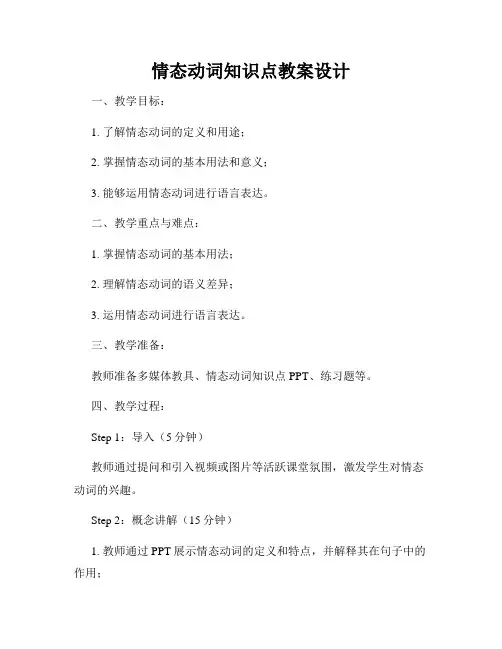
情态动词知识点教案设计一、教学目标:1. 了解情态动词的定义和用途;2. 掌握情态动词的基本用法和意义;3. 能够运用情态动词进行语言表达。
二、教学重点与难点:1. 掌握情态动词的基本用法;2. 理解情态动词的语义差异;3. 运用情态动词进行语言表达。
三、教学准备:教师准备多媒体教具、情态动词知识点PPT、练习题等。
四、教学过程:Step 1:导入(5分钟)教师通过提问和引入视频或图片等活跃课堂氛围,激发学生对情态动词的兴趣。
Step 2:概念讲解(15分钟)1. 教师通过PPT展示情态动词的定义和特点,并解释其在句子中的作用;2. 介绍常见的情态动词有can, could, may, might, will, would, shall, should, must等;3. 引导学生理解情态动词的语义,如表示能力、允许、可能性、推测、意愿、建议、命令等。
Step 3:用法解析(20分钟)1. 教师通过PPT详细讲解情态动词的基本用法,包括肯定句、否定句、疑问句以及其它常用句型;2. 强调情态动词在句子中的位置和变化规律;3. 通过例句和练习题让学生进行互动讨论,加深理解。
Step 4:情态动词间的区别(15分钟)1. 教师列举常见的情态动词,并比较它们的不同用法和意义;2. 强调should的建议、can的能力、must的必需、may的可能性等;3. 让学生进行小组对话或问答练习,加深理解情态动词的语义差异。
Step 5:情景对话(20分钟)1. 教师设计情景对话,让学生运用情态动词进行表达;2. 学生分角色进行对话练习,模拟真实情境;3. 教师适时提供反馈和指导,纠正学生的错误,并鼓励学生积极表达。
Step 6:巩固练习(15分钟)教师分发练习题,让学生独立完成,然后进行讲评,强化对情态动词的掌握程度。
Step 7:拓展延伸(5分钟)教师提供情景讨论或写作活动,让学生运用情态动词进行表达。
五、教学反思:通过本节课的情态动词知识点教案设计,利用多媒体和互动教学方式,激发学生对情态动词的兴趣,帮助学生理解情态动词的基本概念、用法和语义差异,并通过情景对话和练习题的训练,提高学生的语言表达能力。
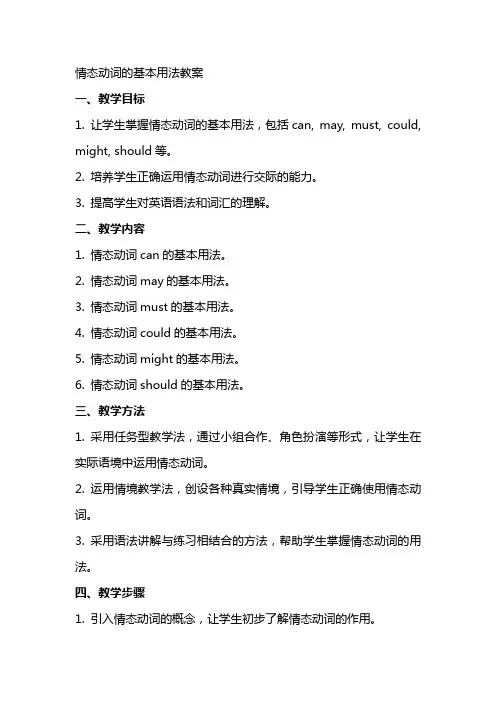
情态动词的基本用法教案一、教学目标1. 让学生掌握情态动词的基本用法,包括can, may, must, could, might, should等。
2. 培养学生正确运用情态动词进行交际的能力。
3. 提高学生对英语语法和词汇的理解。
二、教学内容1. 情态动词can的基本用法。
2. 情态动词may的基本用法。
3. 情态动词must的基本用法。
4. 情态动词could的基本用法。
5. 情态动词might的基本用法。
6. 情态动词should的基本用法。
三、教学方法1. 采用任务型教学法,通过小组合作、角色扮演等形式,让学生在实际语境中运用情态动词。
2. 运用情境教学法,创设各种真实情境,引导学生正确使用情态动词。
3. 采用语法讲解与练习相结合的方法,帮助学生掌握情态动词的用法。
四、教学步骤1. 引入情态动词的概念,让学生初步了解情态动词的作用。
2. 讲解情态动词can的用法,并通过例句和练习让学生加以巩固。
3. 讲解情态动词may的用法,并与can进行对比,让学生区分它们的用法。
4. 讲解情态动词must的用法,特别强调其表示推测和强制性的特点。
5. 讲解情态动词could的用法,并与may进行对比,让学生了解它们的区别。
五、作业与评价1. 作业:让学生运用所学的情态动词完成一个简短的故事或对话。
2. 评价:通过课堂表现、作业完成情况和小组合作等形式,对学生的学习效果进行评价。
教学反思:在教学过程中,要注意关注学生的学习情况,及时解答他们的疑问。
针对不同学生的学习水平,可以适当调整教学内容和难度。
通过多样化的教学活动,激发学生的学习兴趣,提高他们的参与度。
在评价环节,要注重学生的全面发展,既要关注他们的语法知识,也要关注他们的交际能力。
六、教学内容1. 情态动词should的用法,包括其表示建议、责任和建议的用法。
2. 情态动词need的用法,区分其作为情态动词和实义动词的不同用法。
3. 情态动词have to的用法,强调其表示必要性和被迫性的特点。
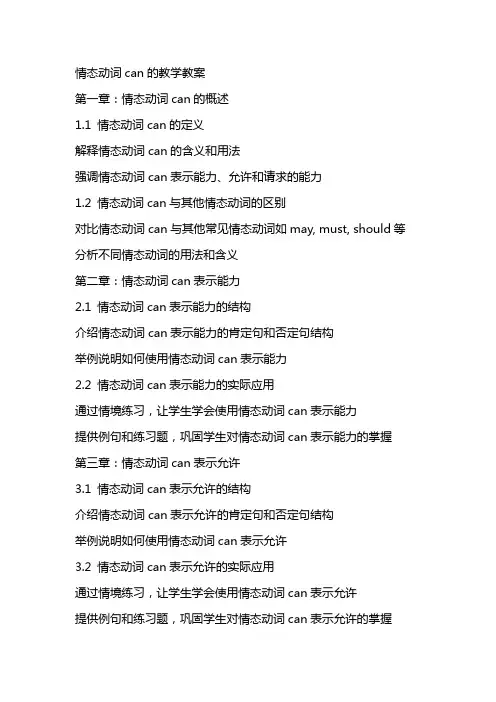
情态动词can的教学教案第一章:情态动词can的概述1.1 情态动词can的定义解释情态动词can的含义和用法强调情态动词can表示能力、允许和请求的能力1.2 情态动词can与其他情态动词的区别对比情态动词can与其他常见情态动词如may, must, should等分析不同情态动词的用法和含义第二章:情态动词can表示能力2.1 情态动词can表示能力的结构介绍情态动词can表示能力的肯定句和否定句结构举例说明如何使用情态动词can表示能力2.2 情态动词can表示能力的实际应用通过情境练习,让学生学会使用情态动词can表示能力提供例句和练习题,巩固学生对情态动词can表示能力的掌握第三章:情态动词can表示允许3.1 情态动词can表示允许的结构介绍情态动词can表示允许的肯定句和否定句结构举例说明如何使用情态动词can表示允许3.2 情态动词can表示允许的实际应用通过情境练习,让学生学会使用情态动词can表示允许提供例句和练习题,巩固学生对情态动词can表示允许的掌握第四章:情态动词can表示请求4.1 情态动词can表示请求的结构介绍情态动词can表示请求的肯定句和否定句结构举例说明如何使用情态动词can表示请求4.2 情态动词can表示请求的实际应用通过情境练习,让学生学会使用情态动词can表示请求提供例句和练习题,巩固学生对情态动词can表示请求的掌握第五章:情态动词can的复习和拓展5.1 情态动词can的复习通过练习题和游戏,复习情态动词can的用法检测学生对情态动词can的掌握程度5.2 情态动词can的拓展介绍情态动词can的其他用法,如用于提供帮助、表达可能性等提供相关练习题,帮助学生拓展情态动词can的用法第六章:情态动词can的否定句6.1 情态动词can的否定句结构解释情态动词can的否定句结构,即“主语+ can't + 动词原形”强调情态动词can的否定句表示能力、允许和请求的否定6.2 情态动词can的否定句实际应用通过情境练习,让学生学会使用情态动词can的否定句提供例句和练习题,巩固学生对情态动词can的否定句的掌握第七章:情态动词can的疑问句7.1 情态动词can的疑问句结构解释情态动词can的疑问句结构,即“Can + 主语+ 动词原形?”强调情态动词can的疑问句用于询问能力、允许和请求7.2 情态动词can的疑问句实际应用通过情境练习,让学生学会使用情态动词can的疑问句提供例句和练习题,巩固学生对情态动词can的疑问句的掌握第八章:情态动词can的语法规则8.1 情态动词can的时态介绍情态动词can与不态的结合使用,如现在时、过去时和将来时举例说明情态动词can的时态变化规则8.2 情态动词can的主语强调情态动词can后的主语必须是人提供练习题,让学生学会正确使用情态动词can的主语第九章:情态动词can的综合练习9.1 情态动词can的混合练习提供含有情态动词can的混合练习题,包括肯定句、否定句和疑问句通过练习题,巩固学生对情态动词can的用法9.2 情态动词can的角色扮演分组进行角色扮演,让学生在实际情境中运用情态动词can鼓励学生大胆表达,提高口语能力第十章:情态动词can的拓展学习10.1 情态动词can的近义词介绍情态动词can的近义词,如be able to, may等举例说明如何使用这些近义词替换情态动词can10.2 情态动词can的交际场景介绍情态动词can在日常生活和社交场合中的常见用法提供相关练习题,帮助学生学会在实际场景中运用情态动词can第十一章:情态动词can的被动语态11.1 情态动词can的被动语态结构解释情态动词can的被动语态结构,即“主语+ be + 过去分词+ can + 动词原形?”强调情态动词can的被动语态用于描述能力、允许和请求的被动情况11.2 情态动词can的被动语态实际应用通过情境练习,让学生学会使用情态动词can的被动语态提供例句和练习题,巩固学生对情态动词can的被动语态的掌握第十二章:情态动词can的错误纠正12.1 情态动词can的常见错误分析学生在使用情态动词can时常见的错误,如时态错误、主语错误等提供正确的例句和解释,帮助学生纠正错误12.2 情态动词can的错误纠正练习提供含有错误的情态动词can的句子,让学生进行纠正练习通过练习题,帮助学生提高正确使用情态动词can的能力第十三章:情态动词can的同义词和反义词13.1 情态动词can的同义词介绍情态动词can的同义词,如be able to, may等举例说明如何使用这些同义词替换情态动词can13.2 情态动词can的反义词介绍情态动词can的反义词,如can't, might not等举例说明如何使用这些反义词表达相反的意思第十四章:情态动词can的综合应用14.1 情态动词can的故事创作让学生创作一个包含情态动词can的故事,要求故事情节丰富,角色生动通过故事创作,提高学生对情态动词can的综合应用能力14.2 情态动词can的口头报告要求学生准备一个关于情态动词can的口头报告,包括情态动词can 的定义、用法、例句等通过口头报告,提高学生的表达和沟通能力第十五章:情态动词can的复习和测试15.1 情态动词can的复习通过练习题和游戏,复习情态动词can的用法检测学生对情态动词can的掌握程度15.2 情态动词can的测试提供一份情态动词can的测试题,包括选择题、填空题和句子完成题通过测试,评估学生对情态动词can的掌握情况,为后续教学提供参考重点和难点解析重点:1. 情态动词can的定义和用法;2. 情态动词can表示能力、允许和请求的结构及实际应用;3. 情态动词can的否定句和疑问句结构及实际应用;4. 情态动词can的时态和主语的用法;5. 情态动词can的被动语态结构及实际应用;6. 情态动词can的同义词、反义词和拓展用法。
高中英语-情态动词的教案(5课时)情态动词(Modal Verbs)共6课时Period 1Studying Aims:1.know more about the Modal Verbs.2.Create the student’s interests of English.3.Master the usage about “can.may.must.need.had better”and so on.Studying Important and Difficult Points:Master the usage about “can.may.must.need.had better”Check list before class:Definition:____________________________________Studying Procedure:Step1.Lead-- in1.教师提问:情态动词都有哪些?2.师生之间相互问候,引出情态动词。
Step2:Presentation一.情态动词有can (could), may (might), must, have to, shall (should, will (would), dare (dared), need (needed), ought to等。
情态动词无人称和数的变化;不能单独使用,必须与其后的动词原形构成谓语。
二.情态动词的用法1. can 用法1)表示能力,与be able to同义,但can只用于现在时和过去时,be able to可用于各种时态。
Two eyes can see more than one.注:Can you …? Yes, I can / No, I can’t.---- Could I come to see you tomorrow?---- Yes, you can. ( No, I’m afraid not. )3). 表示推测“可能”(惊讶、怀疑、不相信的态度),常用于否定句.疑问句和感叹句中。
高中英语情态动词用法教案一、教学目标:1. 理解情态动词的基本概念和用法;2. 掌握情态动词的各种表达方式和用法;3. 能够正确运用情态动词进行语言表达。
二、教学重点:1. 情态动词的概念和特点;2. 情态动词的用法和表达方式。
三、教学难点:1. 情态动词的多样性用法;2. 情态动词与其他动词的区别。
四、教学准备:1. 教材:高中英语教材;2. 多媒体设备。
五、教学过程:步骤一:引入话题(5分钟)1. 引入情态动词的概念和作用,提醒学生情态动词在英语中的重要性;2. 引导学生思考情态动词的一些常见用法,如表示能力、推测、允许等。
步骤二:情态动词的基本概念(10分钟)1. 介绍情态动词的定义和特点;2. 通过例句和图示向学生展示情态动词的用法和表达方式;3. 强调情态动词与其他动词的区别。
步骤三:情态动词的表示能力(15分钟)1. 提供一些列情态动词的例句,要求学生根据上下文理解其表示的能力;2. 对学生进行小组讨论,展示他们对不同情态动词的理解和运用能力;3. 整理学生的回答,总结不同情态动词的表示能力。
步骤四:情态动词的推测和猜测(15分钟)1. 向学生展示一些情态动词的推测和猜测用法;2. 通过练习题目,让学生在实际运用中掌握情态动词的推测和猜测用法;3. 对学生答案进行讲解和解释,纠正他们的错误。
步骤五:情态动词的允许和建议(15分钟)1. 让学生了解情态动词在表示允许和建议方面的用法;2. 提供一些例句和对话进行讨论和练习;3. 强调情态动词在不同语境中的灵活运用。
步骤六:情态动词的其他用法(15分钟)1. 审视情态动词在禁止、可能性、请求等方面的用法;2. 鼓励学生通过阅读练习和交流理解情态动词在不同场合中的用法;3. 引导学生总结情态动词的主要用法和表达方式。
步骤七:情态动词的综合运用(15分钟)1. 提供综合性的情景对话,要求学生根据情境和所学内容进行表达;2. 分组演练,鼓励学生在小组内展示运用情态动词的能力;3. 对学生表现进行评价和指导,帮助他们改进和提高。
Unit 2 Healthy eatingGrammar Modal VerbsⅠ.Knowledge aims :Teaching goals:1. Get students to know more about modal verbs.2. Let students learn the use of ought to, need, needn’t, don’t have to, mustn’t. Abilities goals:Enable students to use modal verbs + have done correctly and properly according to the context.Emotion goals:1. Get students to become interested in grammar learning.2. Develop students’ sense of group cooperation.Ⅱ. Teaching importance:1.The usage of the modal verbs.2.The sameness and difference among these modal verbs.3.Correctly understand the change the modal verbs bring to the sentence, that is ,their functions.Ⅲ.Teaching difficulties:Enable students to learn how to use them correctly.IV. Teaching methods:1. Task-based teaching and learning2. Discovering3. DiscussionV. Teaching Procedures:Step 1 Leading-inT: First listen to an English song and fill in the blanks with modal verbs.Step 2 Revision1. What modal verbs have you learned?can/ couldmay/ mightwill/ wouldshall/ shouldmust/ have toought to / need2. The students read the sentences and fill in the blanks with the proper modal verbs we have learned.Step3 Grammar learningAsk the students: Recently, a TV series is very popular. Do you know what it is? Have you seen it? Who are main characters? Who can introduce briefly? Observe the sentences carefully and finish the following task.1.DiscoveringPlease think about it individually and fill in the form in pencil.2.Exchange what you have discovered with your deskmate and then do some corrections.3.InductionStep4 Discovery1. What can we learn from the TV show?2.Think over and discuss with a partner how each of these modal verbs is being used in the situations. What does each modal verb mean?Duty Necessity Prohibition(禁止) Lack of necessity3. Use the function words above to explain the meaning of the modal verbs. If students have some difficulty, give them a hand.Step5 Practice1. Read the sentences and fill in the blanks with the modal verbs we have just learned.2. Look at the pictures and give some advice. I have given you some key words to help you.Step6 Presentation1. Let students discuss in groups to write down their ideas according to the picturesand key words using the modal verbs they have learned.2. Show their ideas to the studentsStep7 SummarySumming up the use of the modal verbs1).The use of ought to, need, needn’t, don’t have to, mustn’t.2). The use of modal verbs + have doneStep 8 Homework作文:给早恋的同学提几条建议要求:1. 用情态动词和情态动词+ have done2. 字数不得少于80词板书设计Grammar :Modal Verbs I.must have donemay /might have donecan’/couldn’t have donecould have doneshould have doneshouldn’t have doneneedn’t have doneII.ought toneedneedn’tdon’t have tomustn’t。
情态动词英语教案情态动词英语教案【篇一:情态动词can的教学设计】情态动词can的教学设计发布者:付贤彦教学目标:1.知识目标:掌握本课的大纲词汇和情态动词can的用法。
2.能力目标:1)能听懂会不会那些体育运动项目话题的有关的简单会话。
2)能用can或can?t表述会不会那些体育运动项目。
3.文化意识:了解国内外常见的体育运动项目,以及运动项目的种类。
4.学习策略:培养学生在大信息量(许许多多的运动项目中)的语言活动中搜索处理语言信息,发现,归纳学习重点,从而掌握本单元重点学习内容。
教学内容: 1.大纲词汇sport, throw, race, field,新课标词汇high jump, long jump, event, track2.句型he can / can?t …教学重点:用情态动词can表示会不会那些体育运动项目的句子教学手段:多媒体。
教学步骤教学第一个环节:创设情景,导入新课1. 将有关表示体育运动项目的图片由运动员进行曲连接起来,向学生们展播,从而引出sports meeting和sports event词汇。
2. 要求学生以brainstorm的方式说出what sport they know3.把学生已知和未知的有关体育运动项目的图片和单词卡片给学生(4人一组)把词与图联系起来。
(这是学生们做练习的情景)(以下是课堂练习内容)baseball skate swim basketballbadminton ski football 100-meter hurdleshigh jumptennis surf table tennislong jump100-meter race shot putlong jump4. 学习新单词throw the shot putdo the high jump do the long jumpdo the 200 – meter run run the 110-meter hurdles5. 检查单词1)个人或集体朗读单词。
情态动词的基本用法教案一、教学目标:1. 让学生掌握情态动词的基本用法,包括can, may, must, could, might, should等。
2. 培养学生正确运用情态动词进行表达的能力,能在实际情境中进行运用。
二、教学内容:1. 情态动词can的用法:表示能力、允许、请求等。
2. 情态动词may的用法:表示请求、允许、可能性等。
3. 情态动词must的用法:表示必须、肯定、推测等。
4. 情态动词could的用法:表示能力、请求、可能性等。
5. 情态动词might的用法:表示可能性、请求、谦让等。
6. 情态动词should的用法:表示应该、建议、责任等。
三、教学重点与难点:1. 重点:掌握情态动词的基本用法,能够正确运用。
2. 难点:区分情态动词的用法,以及在实际情境中正确选择使用。
四、教学方法:1. 情境教学法:通过设定各种情境,让学生在实际语境中学习情态动词的用法。
2. 互动教学法:引导学生进行小组讨论、角色扮演等互动活动,提高学生的参与度和积极性。
3. 任务型教学法:设计各种任务,让学生在完成任务的过程中运用情态动词。
五、教学步骤:1. 引入:通过图片或故事情境,引出情态动词的概念。
2. 讲解:讲解情态动词的基本用法,举例说明。
3. 练习:设计各种练习题,让学生进行巩固练习。
4. 互动活动:组织学生进行小组讨论、角色扮演等互动活动,运用情态动词。
5. 任务:设计实际任务,让学生在完成任务的过程中运用情态动词。
7. 作业布置:布置相关作业,让学生巩固所学知识。
六、教学评价:1. 课堂参与度:观察学生在课堂上的积极参与程度,包括发言、讨论、表演等。
2. 练习完成情况:检查学生完成练习的情况,包括答案的正确性和书写的规范性。
3. 任务完成情况:评价学生在完成任务过程中的表现,包括情态动词的运用准确性、沟通流畅性等。
4. 作业完成情况:审阅学生作业,评估情态动词用法的掌握程度。
5. 学生自评与互评:鼓励学生进行自我评价和同伴评价,以提高自我意识和团队协作能力。
《情态动词》的用法教案一、教学目标1. 让学生掌握情态动词的基本概念和用法。
2. 培养学生正确运用情态动词进行口语表达和写作。
3. 提高学生对英语语法和词汇的理解能力。
二、教学内容1. 情态动词的定义和分类。
2. 情态动词的肯定句、否定句和疑问句的构成及用法。
3. 常见情态动词的用法和搭配。
4. 情态动词在实际语境中的应用。
三、教学重点与难点1. 情态动词的分类和用法。
2. 情态动词的肯定句、否定句和疑问句的构成。
3. 情态动词的搭配和实际应用。
四、教学方法1. 讲授法:讲解情态动词的基本概念、分类和用法。
2. 互动法:引导学生进行情态动词的肯定句、否定句和疑问句的练习。
3. 情境教学法:通过设置实际语境,让学生运用情态动词进行口语表达和写作。
五、教学步骤1. 引入情态动词的概念,让学生初步了解情态动词的作用。
2. 讲解情态动词的分类,如can、may、must、should等,并举例说明其用法。
3. 引导学生学习情态动词的肯定句、否定句和疑问句的构成,进行相关练习。
4. 讲解情态动词的搭配,如“be able to”、“have to”等,并让学生进行实际运用。
5. 通过设置实际语境,让学生运用情态动词进行口语表达和写作,提高实际应用能力。
六、教学评估1. 课堂练习:设计一些关于情态动词的练习题,包括选择题、填空题和句子完成题,以巩固所学知识。
2. 小组讨论:让学生分组讨论情态动词在实际生活中的应用,选取小组代表进行分享。
3. 口语表达:组织学生进行情景对话,运用情态动词进行口语表达,评估学生的口语运用能力。
七、课后作业1. 让学生结合所学内容,编写一篇小作文,运用情态动词表达自己的观点和看法。
2. 完成课后练习册的相关题目,加深对情态动词用法的理解。
3. 搜集情态动词的实际应用例句,进行分享和交流。
八、拓展活动1. 举办情态动词知识竞赛,激发学生学习兴趣,巩固所学知识。
2. 组织学生进行情态动词的主题演讲,提高学生的口语表达能力和自信心。
Module 5 Grammar and Culture Corner执笔人:赵清芝孙晓妮审核人:王志超签批人:王艳艳情态动词情态动词是高考的重点考查项目,对学习情态动词的要求是:首先、了解情态动词各自的基本意义及用法,然后掌握情态动词表示推测的用法(其中重点是对表过去推测的用法)还要注意带有情态动词的反意疑问句的用法。
情态动词的特征:1.本身有词义,但完全。
因此不能独立作谓语,只能和动词原形一起构成谓语。
2.后接动词不定式一律不带to3.不随人称和数的变化。
情态动词各自的基本意义及用法表四、need与dare的用法对比表表五、should与ought to用法对比表表七:used to 与would 用法对比表情态动词表推测的意义:1、大多数情态动词(除表‘能力、许可、意志’外),都可以表示推测,其程度有差异。
按其可能性程度的高低排列为:Must ﹥will ﹥would ﹥ought to ﹥ should ﹥ can ﹥ could ﹥ may ﹥ might 肯定 完全可能 很可能 可能 有可能 2.注意区分情态动词的否定的含义:may not 或许不、可能不 might not 可能不 can ’t 不可能 mustn ’t 不许、禁止 shouldn ’t 不应该 needn ’t 不必 3.情态动词表推测具体运用:情态动词可以对现在、进行、过去推测巩固提高1. I’m going to Europe on vacation together with John if I ___ find the money. A. can B. might C. would D. need2. --- ____you interrupt now? Can’t you see I’m on the phone?--- Sorry Sir, but it’s urgent.A. CanB. ShouldC. MustD. Would3. I use a clock to wake me up because at six o'clock each morning the train comes by my house.A. couldn'tB. mustn'tC. shouldn'tD. needn't4. One of our rules is that every student ____ wear school uniform while at school.A. mightB. couldC. shallD. will5. Jack is a great talker. It’s high time that he _____ something instead of just talking.A. will doB. has doneC. doD. did6. Days later, my brother called to say he was all right, but ____ say where he was.A. mustn’tB. shouldn’tC. wouldn’tD. mightn’t7. --- I don’t really like James. Why did you invite him?--- Don’t worry. He come. He said he wasn’t certain what his plans were.A. must notB. need notC. would notD. might not8. It _______ be the postman at the door, It’s only six o’clock.A. mustn’tB. can’tC. won’tD. nee dn’t9. If you ______ smoke, please go outside.A. canB. shouldC. mustD. may10. --- Will you read me a story, Mummy?--- OK. You ________ have one if you go to bed as soon as possible.A. mightB. mustC. couldD. shall11. --- Shall I inform him of the change of the schedule right now?--- I am afraid you _____,in case he comes late for the meeting .A. willB. mustC. mayD. can12. They have arrived at lunchtime but their flight was delayed.A. willB. canC. mustD. should13. You_________ buy a gift, but you can if you want to.A. mustB. mustn’tC. have toD. don’t have to14. --- I haven’t got the reference book yet, but I’ll have a test on the subject next month.--- Don’t worry. You______ have it by Friday.A. couldB. shallC. mustD. may15. --- May I take this book out of the reading room?--- No, you . You read it in here.A. mightn’tB. won’tC. needn’tD. mustn’t16. --- I take the book out?--- I'm afraid not.A. WillB. MayC. MustD. Need17. "You __ have a wrong number," she said. "There's no one of that name here. "A. needB. canC. mustD. would18. --- Sorry, Professor Smith. I didn't finish the assignment yesterday.--- Oh, you have done it as yesterday was the deadline.A. mustB. mustn'tC. shouldD. shouldn't19. --- Why____ you be talking so loudly while others are studying?--- I'm terribly sorry.A. shallB. mustC. willD. may20. --- We want someone to take charge of this project.--- _____ the young man have a try?A. mayB. shallC. willD. need21. I promise she ____ get a nice present on her twentieth birthday.A. shallB. shouldC. mustD. would22. The World Wide Web is sometimes jokingly called the World Wide Wait because it ____be very slow.A. shouldB. mustC. willD. can23. --- Is there any flight to New York today?--- I think there _____, for the weather is too bad.A. may not beB. shouldn't beC. can't beD. mustn't be24. Mr. Bush is on time for everything. How ____it be that he was late for the opening ceremony?A. mustB. shouldC. canD. may25. --- Is it good to look up every new word when I come across it in reading?--- No. You ___because you are likely to guess the meaning from the context.A. can'tB. mustn'tC. don't have toD. ought not toCultural CornerActivity 1: Read this passage and answer the following questions:1. What does Mr McCorquodale like doing when he travels?2. What does he take with him when he travels?3. On what conditions is he allowed to stick a pin in the map?4. How does he evaluate China?5. Why does Mr McCorquodale like traveling?。